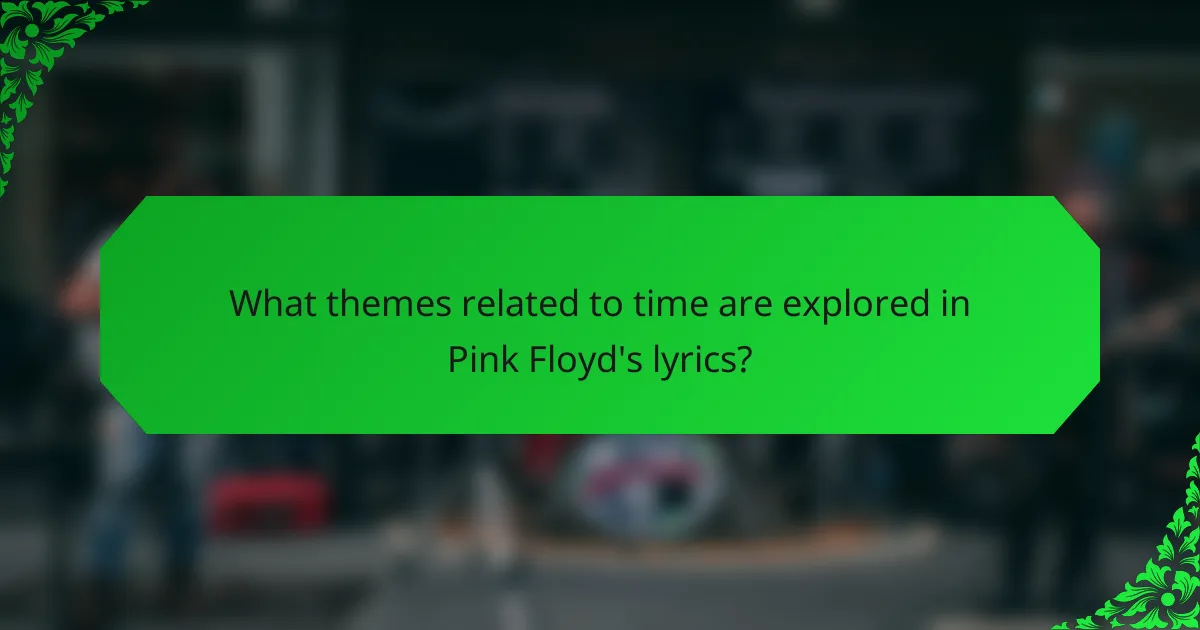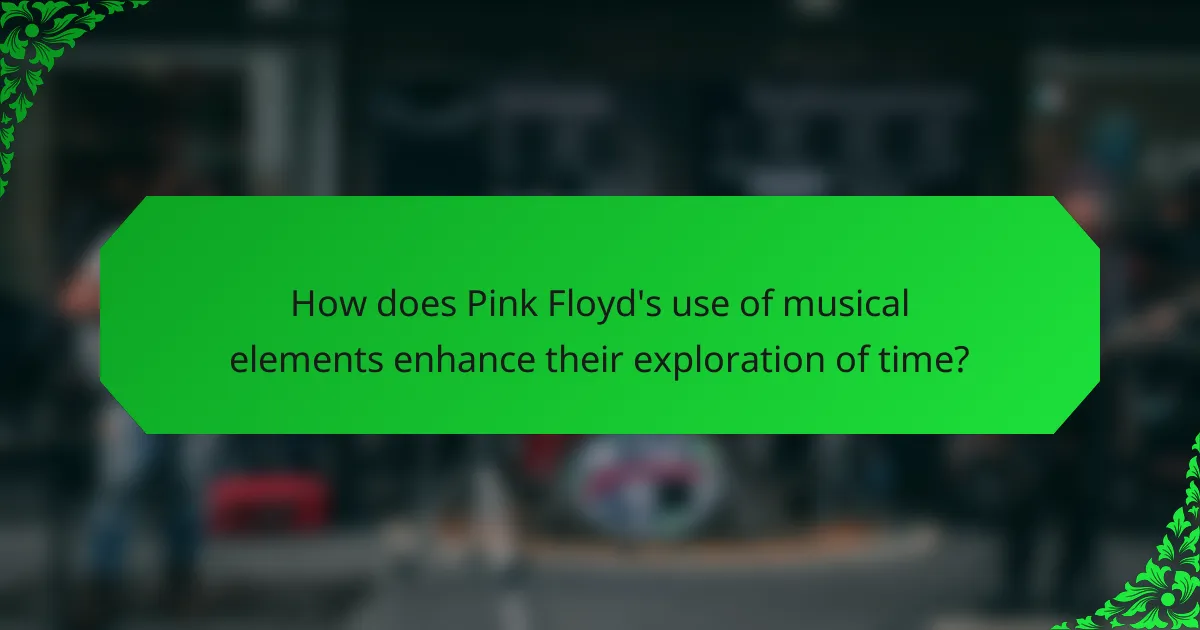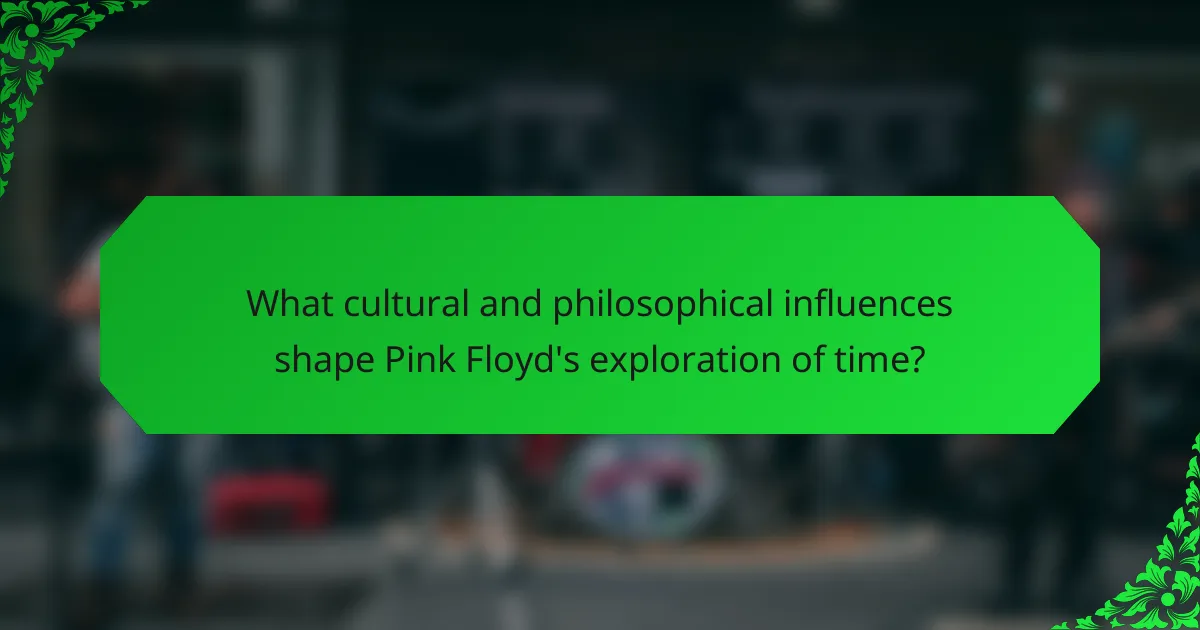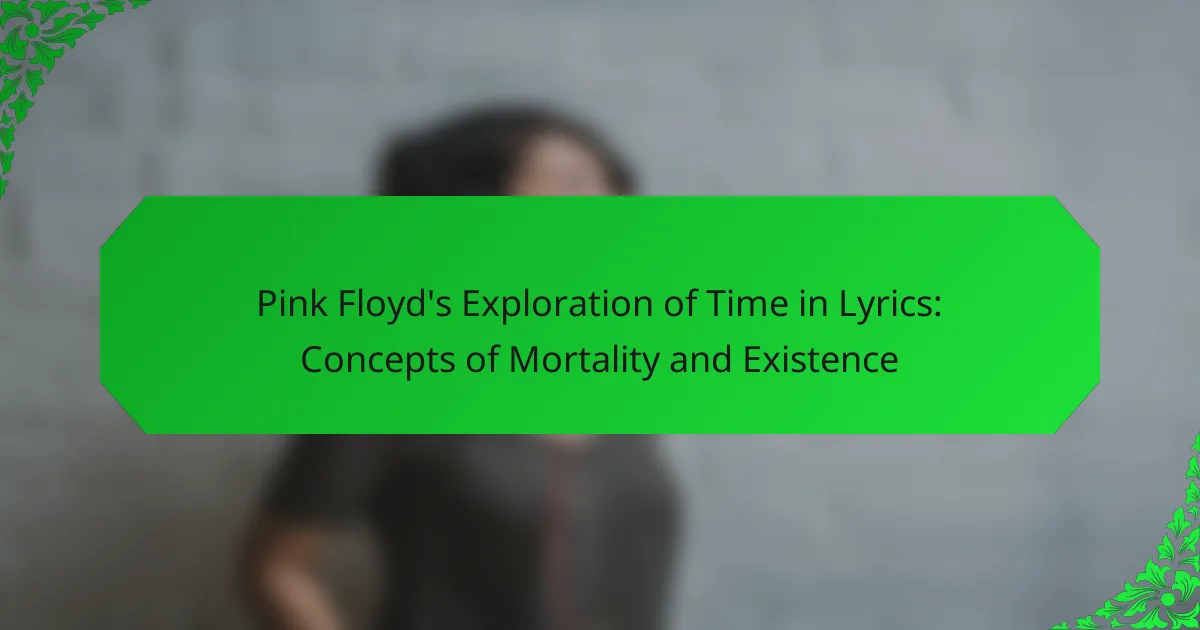Pink Floyd is a renowned rock band whose lyrics delve into themes of time, mortality, and existential reflection. The article explores how their songs, particularly “Time” and “Echoes,” convey the urgency of life’s fleeting nature, the impact of choices, and feelings of nostalgia. It highlights the band’s innovative musical techniques, such as dynamic shifts and immersive soundscapes, which enhance their lyrical exploration of time. Additionally, the article discusses the influence of existential philosophy and cultural critiques on their work, particularly in the context of the 1960s and 1970s, showcasing how these elements contribute to a profound understanding of human existence and its transitory qualities.

What themes related to time are explored in Pink Floyd’s lyrics?
Pink Floyd’s lyrics explore several themes related to time, including the passage of time, mortality, and existential reflection. The band often portrays time as an oppressive force that leads to a sense of urgency and inevitability. In songs like “Time,” they emphasize the fleeting nature of life and the importance of seizing the moment. The lyrics convey feelings of regret over lost time and the impact of choices made throughout life. Additionally, themes of nostalgia and the cyclical nature of existence are prevalent, suggesting a deep contemplation of life’s temporality. Overall, Pink Floyd’s exploration of time reflects a profound awareness of human existence and its transient qualities.
How does Pink Floyd depict the concept of mortality in their music?
Pink Floyd depicts the concept of mortality through themes of loss and existential reflection in their music. Their album “The Dark Side of the Moon” addresses the inevitability of death and the pressures of life. Songs like “Time” emphasize the fleeting nature of existence and the importance of making the most of life. The lyrics convey a sense of urgency and the need to confront mortality. Additionally, “Wish You Were Here” expresses feelings of loss and longing for those who have passed away. The band’s use of somber melodies and introspective lyrics reinforces these themes. Overall, Pink Floyd’s music serves as a profound meditation on life, death, and the human experience.
What specific songs address mortality and the passage of time?
“Time” by Pink Floyd addresses mortality and the passage of time. The song reflects on the fleeting nature of life. It emphasizes how time slips away unnoticed. “The Great Gig in the Sky” also explores themes of mortality. It conveys the inevitability of death through its emotional vocal performance. “Wish You Were Here” touches on loss and longing. The lyrics express a sense of absence and remembrance. “Us and Them” presents a perspective on life’s conflicts and time’s impact. Each song encapsulates a unique facet of mortality and the passage of time.
How do the lyrics convey feelings of loss and existential reflection?
The lyrics convey feelings of loss and existential reflection through vivid imagery and poignant themes. They often depict the passage of time as an inevitable force that leads to regret and sorrow. Metaphors related to fading memories illustrate the pain of lost connections. The use of somber tones creates an atmosphere of introspection. Recurrent motifs of absence highlight the emotional weight of loss. Additionally, existential questions challenge the listener to contemplate their own mortality. This combination evokes a profound sense of melancholy and contemplation. The lyrics resonate with universal experiences of grief and searching for meaning in life.
What role does time play in the narrative of Pink Floyd’s albums?
Time is a central theme in the narrative of Pink Floyd’s albums. It influences their exploration of mortality and existence. The album “The Dark Side of the Moon” features the iconic track “Time,” which reflects on the fleeting nature of life. Lyrics convey a sense of urgency and the inevitability of aging. Additionally, “Wish You Were Here” addresses the passage of time through themes of loss and nostalgia. The concept of time shapes the emotional landscape of their music. Pink Floyd’s use of time creates a profound connection with listeners. This exploration invites reflection on personal experiences and the human condition.
How does the structure of their albums reflect the theme of time?
The structure of Pink Floyd’s albums often mirrors the theme of time through their conceptual continuity. Each album typically unfolds in a linear progression, reflecting the passage of time. For example, “The Dark Side of the Moon” presents a seamless flow of tracks that transition smoothly, illustrating the relentless nature of time. The use of recurring musical motifs and lyrical references to time enhances this theme. In “Wish You Were Here,” the album’s structure juxtaposes past and present, emphasizing nostalgia and loss. Additionally, “The Wall” employs a narrative arc that traces the protagonist’s life, encapsulating the impact of time on personal experiences. These structural choices reinforce the overarching exploration of time, mortality, and existence throughout Pink Floyd’s discography.
What songs illustrate the cyclical nature of time and existence?
“Time” by Pink Floyd illustrates the cyclical nature of time and existence. The lyrics emphasize the relentless passage of time. They convey a sense of urgency as life progresses. Another song, “Echoes,” explores themes of continuity and interconnectedness. It reflects on the eternal return of experiences and emotions. “Us and Them” also touches on the cyclical nature of human conflict and relationships. The lyrics highlight the repetitive patterns in society. Each song encapsulates the philosophical reflections on time and existence. These works collectively showcase Pink Floyd’s deep engagement with these concepts.

How does Pink Floyd’s use of musical elements enhance their exploration of time?
Pink Floyd’s use of musical elements significantly enhances their exploration of time. Their compositions often feature extended instrumental sections that create a sense of timelessness. For example, “Time” incorporates ticking clocks and a gradual build-up of sound to convey urgency. The use of dynamic shifts in volume and tempo reflects the passage of time and emotional intensity. Additionally, the incorporation of synthesizers and sound effects creates an immersive experience that emphasizes the theme of time. Tracks like “Echoes” demonstrate seamless transitions that blur the lines between past and present. Through these musical techniques, Pink Floyd effectively communicates complex concepts of mortality and existence.
What musical techniques are employed to convey themes of time and mortality?
Musical techniques employed to convey themes of time and mortality include the use of tempo changes, repetition, and dissonance. Tempo changes create a sense of urgency or reflection. For example, slower tempos often evoke feelings of contemplation about life and death. Repetition reinforces the cyclical nature of time. This technique can be heard in recurring musical phrases that mirror the relentless passage of time. Dissonance introduces tension and unease, reflecting the discomfort associated with mortality. Pink Floyd’s “Time” exemplifies these techniques through its ticking clock sounds and gradual buildup, symbolizing the inevitability of aging. These elements collectively enhance the emotional impact of the themes present in their music.
How do tempo and rhythm contribute to the emotional impact of the lyrics?
Tempo and rhythm significantly enhance the emotional impact of lyrics. Tempo refers to the speed of a piece of music, while rhythm is the pattern of sounds and silences. Together, they create a mood that aligns with the lyrical content. For instance, a slow tempo often evokes feelings of sadness or reflection. In contrast, a fast tempo can generate excitement or urgency.
Rhythm adds texture to the lyrics, emphasizing certain words or phrases. This can amplify the emotional weight of the message. Studies show that specific rhythmic patterns can trigger emotional responses in listeners. For example, syncopated rhythms may create tension, while steady beats can provide comfort.
In Pink Floyd’s work, tempo and rhythm are intricately woven into their exploration of mortality and existence. The haunting tempo in “Time” complements its themes of regret and the passage of life. This synergy between musical elements and lyrics deepens the listener’s emotional experience.
What role does instrumentation play in the perception of time in their music?
Instrumentation significantly influences the perception of time in Pink Floyd’s music. The band’s use of varied instruments creates distinct auditory textures. For example, synthesizers and guitars can evoke a sense of vastness and eternity. This contrasts with rhythmic elements like drums, which provide a structured sense of time. The layering of sounds can create a feeling of timelessness, as heard in tracks like “Time.” Additionally, tempo changes within songs can manipulate listeners’ experiences of duration. Studies show that auditory cues can alter time perception, supporting this effect in their music. Overall, instrumentation serves as a crucial element in shaping how time is experienced in Pink Floyd’s work.
How do the lyrics interact with the musical composition to deepen the message?
Lyrics and musical composition interact to deepen the message by creating emotional resonance. Pink Floyd’s use of melodic progression aligns with lyrical themes of time and mortality. The somber tones in the music enhance the reflective nature of the lyrics. For example, in “Time,” the ticking clock sound mirrors the urgency expressed in the words. This synchronization amplifies the listener’s awareness of life’s fleeting moments. Additionally, dynamic shifts in the music underline key lyrical phrases, adding weight to their meaning. The overall atmosphere crafted by instrumentation complements the existential questions posed in the lyrics. This synergy between lyrics and music fosters a profound understanding of the themes.
What examples show the synergy between lyrics and music in conveying existential themes?
“Time” by Pink Floyd exemplifies the synergy between lyrics and music in conveying existential themes. The song’s lyrics discuss the passage of time and the inevitability of mortality. The music features a haunting melody that enhances the sense of urgency and reflection. The ticking clock sound at the beginning symbolizes the relentless march of time. This auditory cue reinforces the lyrical message about life’s fleeting nature. Additionally, the somber tone of the instrumentation complements the contemplative nature of the lyrics. Another example is “The Great Gig in the Sky,” where the vocal performance conveys deep emotion without words. The music’s crescendos mirror the existential struggle described in the lyrics. Together, these elements create a profound exploration of existence and mortality.
How does the use of silence or pauses enhance the exploration of time?
The use of silence or pauses enhances the exploration of time by creating a sense of reflection and contemplation. In music, silence can accentuate moments, allowing listeners to process emotions and thoughts. Pink Floyd effectively employs pauses to convey themes of mortality and existence. For instance, in “Time,” the pauses emphasize the fleeting nature of life. These intentional breaks invite listeners to consider their own experiences with time. Research in music psychology indicates that silence can deepen emotional responses. This connection between silence and time enriches the overall narrative within the lyrics.

What cultural and philosophical influences shape Pink Floyd’s exploration of time?
Pink Floyd’s exploration of time is shaped by existential philosophy and cultural critiques of modernity. Existentialism emphasizes the subjective experience of time, influencing lyrics that reflect on mortality and the fleeting nature of existence. The band’s work often critiques consumerism and societal pressures, reflecting the cultural context of the 1960s and 1970s. Influences from thinkers like Albert Camus and Friedrich Nietzsche are evident in their themes of absurdity and the search for meaning. Additionally, the use of innovative soundscapes mirrors the disorientation of contemporary life. Their album “The Dark Side of the Moon” encapsulates these ideas, addressing the passage of time and its impact on human experience. The philosophical depth of their lyrics resonates with listeners, creating a lasting cultural impact.
How do philosophical concepts of time and existence appear in their lyrics?
Philosophical concepts of time and existence appear prominently in Pink Floyd’s lyrics. The band often reflects on the nature of time as a relentless force. In songs like “Time,” they describe how time slips away and the urgency of living fully. The lyrics convey a sense of existential contemplation. Themes of mortality are evident, as they explore the inevitability of death. In “The Dark Side of the Moon,” the lyrics address the human experience and the passage of time. This creates a profound connection to existential philosophy. The music serves as a backdrop for these deep reflections, enhancing the emotional impact. Overall, their lyrics invite listeners to ponder their own existence and the fleeting nature of time.
What existentialist themes are reflected in Pink Floyd’s work?
Pink Floyd’s work reflects several existentialist themes, including alienation, the search for meaning, and the absurdity of existence. Their lyrics often depict feelings of isolation, as seen in songs like “Comfortably Numb.” This track illustrates a disconnection from reality and self, a common existentialist concern. Additionally, “Time” emphasizes the fleeting nature of life, prompting listeners to confront their mortality. The song “The Wall” explores the construction of barriers to cope with pain, highlighting the struggle for identity. These themes resonate with existentialist philosophers like Jean-Paul Sartre and Albert Camus, who examined the human condition and individual experience. Pink Floyd’s music serves as a profound commentary on existential dilemmas faced by individuals.
How do historical events influence the band’s perspective on time?
Historical events significantly influence Pink Floyd’s perspective on time. The band’s lyrics often reflect the societal turbulence of their era. For example, the Vietnam War and its impact on youth shaped their views on mortality. The 1960s counterculture movement also contributed to their exploration of existential themes. Events such as the rise of consumerism prompted critiques of life’s fleeting nature. Additionally, personal experiences, like the loss of band member Syd Barrett, deepened their reflections on time. Their music captures a sense of urgency and introspection linked to these historical contexts. Thus, historical events are integral to understanding their complex relationship with time.
What impact has Pink Floyd’s exploration of time had on listeners and culture?
Pink Floyd’s exploration of time has profoundly impacted listeners and culture by prompting deep reflection on mortality and existence. Their album “The Dark Side of the Moon” features themes of time that resonate with audiences. The song “Time” emphasizes the fleeting nature of life, encouraging listeners to consider how they spend their time. This has led to increased awareness about the importance of living in the moment.
Culturally, Pink Floyd’s work has influenced various artistic expressions, including film and literature. The band’s use of innovative soundscapes and lyrics has inspired countless musicians and artists. Their exploration of time has sparked discussions about mental health and existentialism. This has contributed to a broader cultural dialogue about life’s impermanence.
Overall, Pink Floyd’s focus on the concept of time has left a lasting legacy, shaping both personal reflections and cultural narratives.
How have fans interpreted the themes of mortality and existence in their music?
Fans have interpreted the themes of mortality and existence in Pink Floyd’s music as profound reflections on the human condition. They often connect the lyrics to personal experiences of loss and the inevitability of death. Songs like “Time” emphasize the fleeting nature of life, prompting listeners to contemplate their own mortality. “The Dark Side of the Moon” explores existential questions, resonating with fans who face their own struggles. The band’s use of imagery and metaphor deepens the emotional impact, allowing fans to relate their own existential fears to the music. This connection fosters a community of listeners who share interpretations and insights, enhancing the overall appreciation of the themes.
What legacy has Pink Floyd left in the context of music and philosophical discourse?
Pink Floyd has left a profound legacy in music and philosophical discourse through their exploration of complex themes. Their albums often address existential questions, the passage of time, and the human condition. “The Dark Side of the Moon” examines mental health and societal pressures. “Wish You Were Here” reflects on absence and alienation. Their use of innovative soundscapes and lyrical depth encourages listeners to ponder life’s meaning. The band’s influence extends to various genres, inspiring countless artists. Their philosophical inquiries resonate with audiences, prompting discussions on mortality and existence. Pink Floyd’s music serves as a bridge between art and philosophy, shaping cultural conversations.
What practical insights can be drawn from Pink Floyd’s exploration of time in their lyrics?
Pink Floyd’s exploration of time in their lyrics reveals significant insights about the human experience. The lyrics often emphasize the fleeting nature of time and its impact on life choices. For instance, songs like “Time” highlight how procrastination can lead to regret. The band illustrates that time is a precious resource that should be valued. They also convey a sense of urgency in making the most of one’s life. This perspective encourages listeners to reflect on their mortality and the importance of living authentically. Pink Floyd’s lyrics serve as a reminder to prioritize meaningful experiences over material pursuits. Their exploration of time ultimately prompts introspection about life’s purpose and the inevitability of aging.
The main entity of the article is Pink Floyd, a progressive rock band known for their profound exploration of time in their lyrics, particularly regarding concepts of mortality and existence. The article examines how Pink Floyd addresses themes such as the passage of time, the inevitability of death, and existential reflection through their music. Key songs like “Time,” “The Great Gig in the Sky,” and “Wish You Were Here” illustrate these themes, highlighting feelings of loss and urgency. Additionally, the article discusses the interplay between musical elements and lyrical content, emphasizing how these aspects enhance the emotional impact of their exploration of time. Overall, Pink Floyd’s work reflects a deep engagement with philosophical concepts and cultural critiques, leaving a lasting legacy in both music and philosophical discourse.
